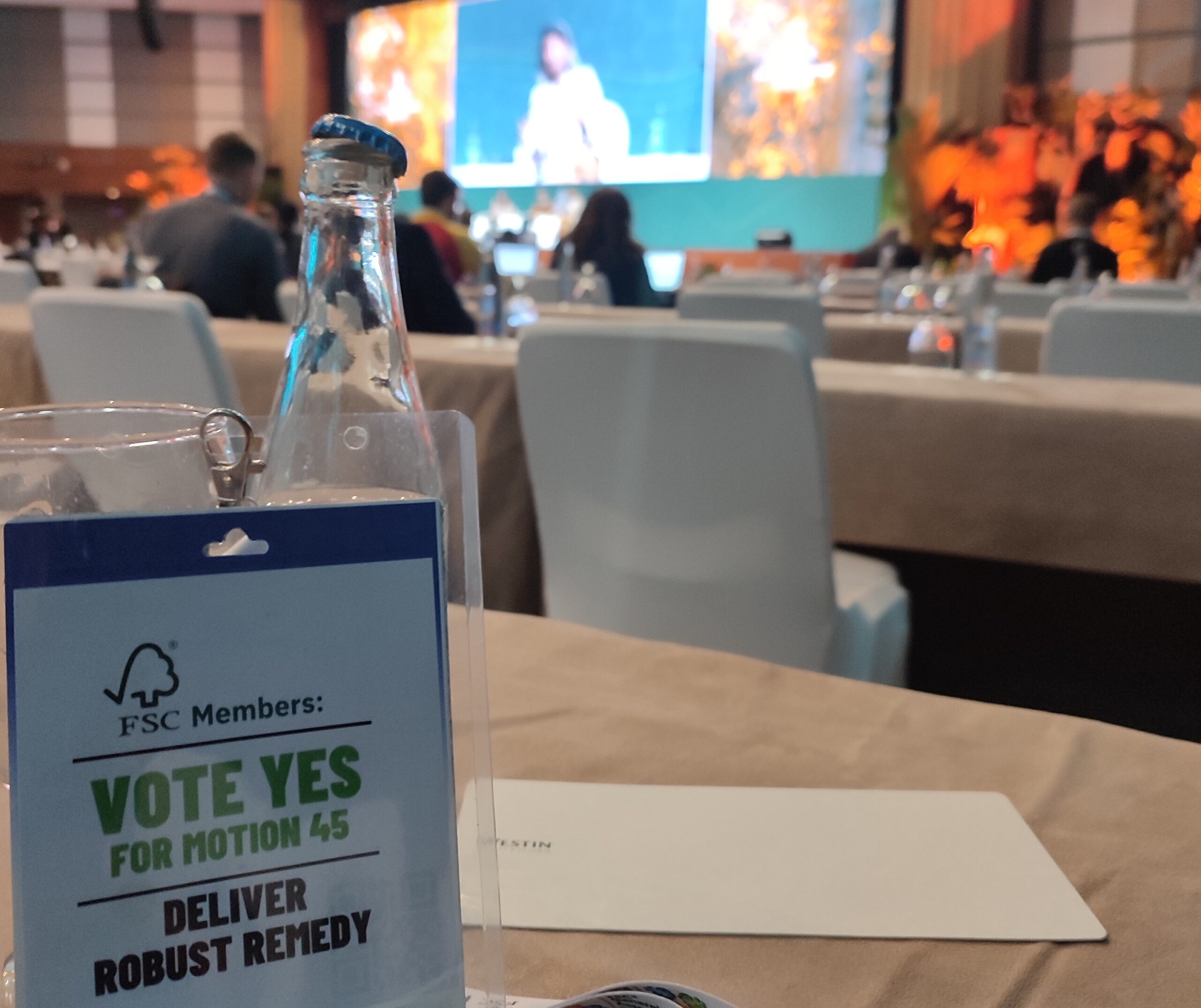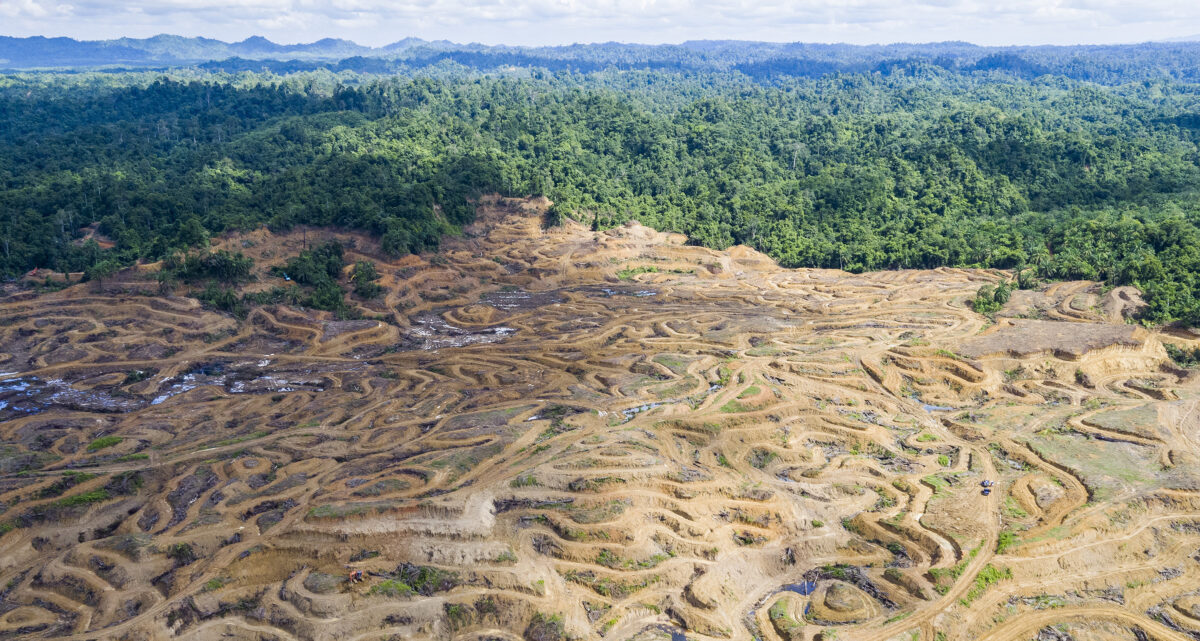The Forest Stewardship Council (FSC) General Assembly meeting in Bali this October resulted in far-reaching changes to the FSC’s sustainable timber and paper certification scheme.
Changes to the 1994 conversion cut-off date and the FSC’s new Remedy Framework will have long-lasting impacts on forests and frontline communities affected by industrial-scale deforestation linked to pulp plantations across Indonesia. Rule changes also impact the brands and banks that use the FSC system to verify if their suppliers, or clients, are driving deforestation and conversion in their forestry operations.
What’s changed?
FSC members voted to change the forest management standards that the FSC uses to certify the operations of forestry companies across the globe. One of the biggest changes is to the FSC’s position on forest conversion, which previously prohibited the certification of pulp plantations converted from forests after November 1994. FSC members voted to change this “conversion cut-off date” to 2020, which has the potential to encourage greenwashing by forest-destroying companies at a level not seen in decades. It also places the FSC’s standard out of step with more ambitious cut-off dates enshrined in the voluntary policies of corporations and public policies in key tropical rainforest regions.
The new 2020 cut-off date allows some of the world’s most notorious rainforest destroyers, like Asia Pulp and Paper and APRIL, to obtain certification under the FSC’s most stringent standards, legitimizing 26 years of forest harms. Together, these companies have cleared more than two million hectares of Indonesia’s rainforests for pulp plantations, inciting hundreds of ongoing conflicts with Indigenous Peoples and traditional communities in the process.1 Any effort to bring APP and APRIL into good standing with the FSC poses a massive risk to the reputation of the FSC system.
Why did the FSC change its conversion cut-off date?
The FSC claims that moving the cut-off date to 2020 will allow it to play a role in restoring forests converted after 1994 and remedy any social harms caused during conversion of those forests. However, the FSC’s track record does not inspire confidence. Countless communities have filed complaints against FSC-certified members and have still not received remedy.
In addition to its poor track record of delivering remedy, the FSC’s new Remedy Framework — which it will use to determine remedy for harms that companies cause to forests and communities — has major unaddressed gaps. RAN, FSC members and a delegation of affected communities from Indonesia, including communities affected by APRIL and Korindo, raised these issues during the General Assembly meeting. Community members delivered a letter calling on FSC members to strengthen the Remedy Framework.
Fortunately, FSC members passed a motion (Motion 45) requiring enhancements and improvements to the Remedy Framework before implementation. It is critical that the FSC implement Motion 45 in full, and that it hears the voices of impacted communities and ensures the development of procedures that center their needs and deliver long-overdue justice.

Will the FSC follow through?
So the question remains — can the FSC do what it has never done, and deliver remedy to Indigenous Peoples and traditional communities harmed by companies that wear the coveted FSC badge? Can it ensure remedy corresponding to the scale of destruction wrought on Indonesia’s forests and communities by the biggest corporate groups in the forestry sector?
FSC’s credibility can only be measured by its actions, not by its hopes or ambitions. The legitimacy of the FSC hangs in the balance in the coming eight months — the timeline set to implement improvements to the Remedy Framework. A key first step is for the FSC to meet with civil society organizations in Indonesia and work collaboratively to address the gaps in the Remedy Framework.
Reputation at Risk
The FSC risks its reputation as the world’s leading forestry certification scheme if it fails to deliver remedy and proportionate restoration from APP, APRIL, Korindo and other controversial companies before granting them membership or forest management certification. Failing to do so will cast the FSC as irrelevant in the global market and in the eyes of those who care about the world’s forests and frontline communities.
These developments are another reminder of the urgent need for brands and banks to not rely on certification systems to implement their No Deforestation, No Peatland and No Exploitation policies and to take further actions to address their role in deforestation and human rights abuse in forest risk commodity supply chains.
1https://eyesontheforest.or.id/uploads/default/report/Eyes-on-the-Forest-Investigative-Report-The-truth-behind-APPs-greenwash.pdf
https://environmentalpaper.org/wp-content/uploads/2020/03/APP-social-conflicts-mapping.pdf
https://www.eyesontheforest.or.id/reports/sustaining-deforestation-aprils-links-with-pt-adindo-hutani-lestari-undercut-no-deforestation-pledge
https://environmentalpaper.org/wp-content/uploads/2019/09/APRIL-social-conflicts-mapping.pdf












